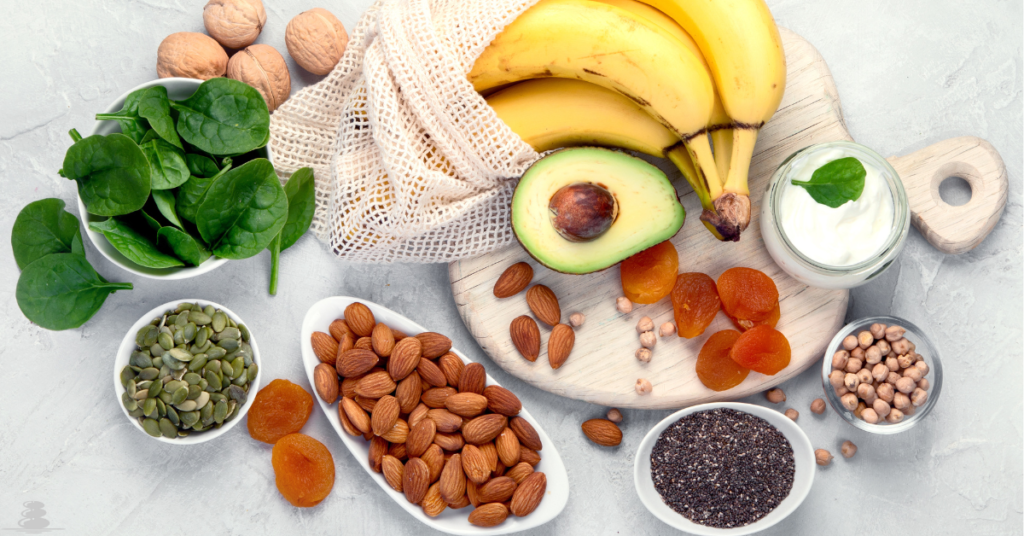If you’ve ever looked into nutrition, weight loss, or fitness, you’ve probably heard the term macronutrients (or macros for short). But what exactly are they, and why do they matter? Macronutrients—protein, carbohydrates, and fats—are the fundamental building blocks of a healthy diet and play a crucial role in energy production, muscle growth, metabolism, and overall well-being.
Understanding how these nutrients work can help you make better food choices, improve performance, and reach your health goals—whether that’s losing weight, gaining muscle, or sustaining energy throughout the day. In this guide, we’ll break down each macro, show you the best sources, and help you create a balanced diet tailored to your needs!
What Are Macronutrients?
Macronutrients are the three essential nutrients your body needs in large amounts to function properly: Protein, Carbohydrates, and Fats. Each macro plays a unique role in keeping you energized and healthy.
Protein – The building block of muscles, skin, and enzymes. It plays a key role in muscle repair, immune function, and the production of essential hormones and enzymes that regulate bodily functions. Protein also helps keep you full longer, making it an important macronutrient for weight management.
Carbohydrates – Your body’s primary source of energy. Carbs fuel your brain, muscles, and organs, providing the necessary energy for daily activities and exercise. They come in two forms: simple carbs, which provide quick bursts of energy, and complex carbs, which offer sustained energy and fiber for better digestion.
Fats – Essential for brain function, hormone production, and cell health. Healthy fats support heart health, reduce inflammation, and aid in nutrient absorption, particularly fat-soluble vitamins like A, D, E, and K. They also help maintain long-term energy levels and keep you feeling satiated after meals.
Now, let’s dive into each one!
Protein: The Body’s Builder

Protein is crucial for muscle growth, tissue repair, and overall body function. It’s also essential for hormone production, immune system support, and enzyme function. When you work out, your muscles break down, and protein helps rebuild them stronger. Protein is also the most satiating macronutrient, helping you stay full longer and reducing cravings.
Best High-protein foods:
- Lean Meats – Chicken, turkey, fish (salmon, cod, tuna), lean beef, and bison are packed with high-quality protein and essential amino acids.
- Eggs and Dairy – Whole eggs, Greek yogurt, cottage cheese, and cheese provide a great mix of protein and healthy fats.
- Plant-Based Proteins – Lentils, chickpeas, black beans, tofu, tempeh, edamame, quinoa, and seitan are excellent options for vegetarians and vegans.
- Nuts and Seeds – Almonds, walnuts, peanuts, cashews, chia seeds, flaxseeds, hemp seeds, and pumpkin seeds provide protein, fiber, and healthy fats.
- Protein Supplements – Whey, casein, and plant-based protein powders (pea, soy, rice) can be great for meeting daily protein needs, especially for those with high activity levels.
How much do you need? A general rule of thumb is 0.8–1.2g of protein per kg of body weight (more if you’re active or looking to build muscle). Some athletes and bodybuilders aim for up to 1.6–2.2g per kg to optimize performance and recovery.
Carbohydrates: Your Energy Powerhouse
Carbohydrates often get a bad reputation, but they are your body’s preferred and most efficient source of energy. Every cell in your body, including your brain, relies on glucose—derived from carbs—to function optimally. Whether you’re working out, going about your daily tasks, or simply thinking, carbs are fueling you. They also play a key role in digestive health, muscle recovery, and maintaining blood sugar balance.
Best Carb Sources:
- Whole Grains – Brown rice, quinoa, oats, whole wheat bread, barley, bulgur, and farro provide fiber, vitamins, and minerals for sustained energy.
- Fruits – Bananas, berries, apples, oranges, pears, and mangoes offer quick, natural energy along with essential vitamins and antioxidants.
- Vegetables – Sweet potatoes, carrots, spinach, broccoli, bell peppers, and beets contain fiber and slow-digesting carbs that keep you full longer.
- Legumes – Beans, lentils, chickpeas, and peas are rich in complex carbs, fiber, and protein, making them an excellent energy source.
- Dairy Products – Milk and yogurt contain lactose, a natural sugar that provides quick energy while also delivering protein and calcium.
Simple vs. Complex Carbs:
- Simple Carbs – Found in white bread, sugary snacks, soda, and pastries, these provide quick energy spikes but can lead to crashes.
- Complex Carbs – Found in whole grains, vegetables, and legumes, these provide steady, long-lasting energy and help maintain blood sugar levels.
How Many Carbs Do You Need? Your carb intake depends on your lifestyle and activity level:
- Sedentary individuals may need around 45–50% of daily calories from carbs.
- Active individuals and athletes may require 50–60% for optimal performance and recovery.
- Low-carb diets (like keto) reduce carbs to 10–30%, but this isn’t necessary for everyone.
Carbs are not the enemy! Choosing high-quality, fiber-rich carbs will keep you energized, improve digestion, and support overall health.
Fats: The Essential Nutrient
Fats have long been misunderstood, often blamed for weight gain and health issues. However, healthy fats are essential for brain function, hormone production, and overall well-being. They play a crucial role in cell membrane integrity, vitamin absorption (A, D, E, and K), and energy storage. Unlike carbohydrates, fats provide a more sustained and long-lasting energy source, making them an important macronutrient in a balanced diet.
Types of Fats & Best Sources:
- Unsaturated Fats (Healthy Fats) – Found in avocados, olive oil, nuts (almonds, walnuts, cashews), seeds (chia, flax, sunflower), and fatty fish (salmon, mackerel, sardines), these fats support heart health and reduce inflammation.
- Saturated Fats – Present in foods like coconut oil, butter, cheese, and grass-fed meats, these fats can be part of a healthy diet when consumed in moderation.
- Omega-3 Fatty Acids – Found in flaxseeds, walnuts, chia seeds, and fatty fish, these are essential for brain health, reducing inflammation, and supporting heart function.
- Omega-6 Fatty Acids – Found in vegetable oils (sunflower, soybean, corn oil) and nuts, they are essential but should be balanced with omega-3s to prevent excessive inflammation.
Fats to Avoid:

- Trans Fats – Found in processed foods, fried items, margarine, and many packaged snacks, trans fats increase the risk of heart disease and should be avoided as much as possible.
- Highly Processed Vegetable Oils – Excessive consumption of soybean, corn, and canola oils can contribute to inflammation and imbalance omega-6 to omega-3 ratios.
How Much Fat Do You Need? The recommended daily intake varies based on dietary goals and activity levels:
- General Health – About 20-35% of daily calories from healthy fats.
- Weight Loss – A moderate fat intake helps control hunger and support metabolism.
- Keto Diet – Requires 60-75% of daily calories from fats to maintain ketosis.
Bottom Line: Don’t fear fats! Choosing natural, unprocessed fats will keep your brain sharp, hormones balanced, and energy levels stable while supporting overall health.
Balancing Your Macros for Optimal Health
Achieving the right balance of macronutrients is key to supporting your health, energy levels, and fitness goals. The ideal macronutrient ratio varies based on factors like age, activity level, metabolism, and personal health objectives.
For Weight Loss – A higher protein intake with moderate fats and lower carbs can help preserve lean muscle mass while promoting fat loss. Many people follow a 40% protein, 30% fats, and 30% carbs approach to sustain energy and maintain muscle.
For Muscle Gain – Carbs become more essential as they provide the necessary fuel for intense workouts. A common breakdown is 40-50% carbs, 25-30% protein, and 20-30% fats to support muscle repair and growth.
For Overall Health & Maintenance – A balanced mix of carbs (40-50%), proteins (25-30%), and healthy fats (20-30%) ensures steady energy, cognitive function, and overall well-being.
The Best Approach? There is no one-size-fits-all solution! Pay attention to your body’s signals, track how different macro ratios affect your energy and performance, and adjust accordingly. Flexible dieting approaches like Intuitive Eating or Macro Tracking can help tailor your intake to fit your specific needs and lifestyle.
Conclusion: Mastering Your Macros for a Healthier You
Understanding macronutrients—protein, carbohydrates, and fats—is key to fueling your body efficiently, optimizing performance, and maintaining overall well-being. Each macro plays a unique role, and finding the right balance tailored to your goals can help you achieve sustainable energy, better digestion, muscle growth, and weight management.
Instead of following restrictive diets, focus on quality food choices and a balanced intake that supports your lifestyle. Whether you’re looking to lose weight, gain muscle, or simply feel your best, tracking and adjusting your macros can be a game-changer.
The best diet is the one that works for you! Experiment, listen to your body, and embrace a flexible approach to nutrition.
Images: canva



